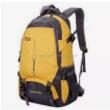1. Size and Capacity:
- Finding the right balance between a backpack’s size and capacity is crucial. Too small, and you won’t fit all your essentials; too large, and you might overpack and carry unnecessary weight.
2. Comfort vs. Style:
- Stylish backpacks might not always be the most comfortable for extended wear. Striking the right balance between aesthetics and comfort can be challenging.
3. Durability:
- Travel backpacks need to withstand various conditions, including rough handling, weather, and potential wear and tear. Choosing a durable option is essential for longevity.
4. Purpose and Activities:
- The type of travel you’re embarking on (backpacking, city exploration, outdoor adventures) dictates the features you need in a backpack. One size does not fit all in terms of functionality.
5. Budget Constraints:
- High-quality travel backpacks can be an investment, but travelers often need to balance their desire for quality with their budget limitations.
6. Packing and Accessibility:
- Some backpacks open from the top, while others have front-loading zippers or even clamshell designs. Choosing the right opening style for your packing preferences matters.
7. Weight Distribution:
- Ensuring the backpack distributes weight properly is vital for comfortable wear, especially if you’re carrying the backpack for extended periods.
8. Airlines’ Carry-On Regulations:
- If you’re planning to carry your backpack onto flights, it’s essential to ensure it meets the airline’s size and weight restrictions for carry-on baggage.
9. Security and Anti-Theft Features:
- Travelers are concerned about the safety of their belongings. Backpacks with anti-theft features, lockable zippers, and hidden pockets are increasingly sought after.
10. Brand Loyalty vs. Exploration: – Sticking to a familiar brand can offer a sense of reliability, but sometimes trying a new brand might lead to discovering a better-suited option.
11. Sustainability and Ethical Considerations: – Many travelers are concerned about the environmental impact of their purchases. Choosing a sustainable and ethically produced backpack can be important to some.
12. Changing Needs Over Time: – A backpack that’s perfect for one trip might not be suitable for another due to changing activities, destinations, and personal preferences.
13. Size and Fit: – Ensuring the backpack fits your body size and shape is essential for comfort and preventing strain or discomfort during travel.
Navigating the great travel backpack dilemma involves careful research, understanding your personal needs, and possibly making compromises based on your priorities. Reading reviews, trying on backpacks in person, and seeking recommendations from experienced travelers can all help you make a more informed decision. Remember that there’s no one-size-fits-all answer; the best travel backpack is the one that aligns with your individual travel style and preferences.


























